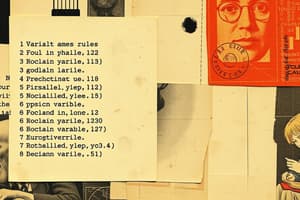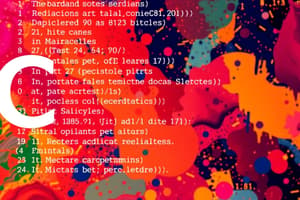Podcast
Questions and Answers
Which of the following represents a characteristic of procedural programming in C?
Which of the following represents a characteristic of procedural programming in C?
- Variables can be accessed globally without restrictions.
- The language does not support recursion.
- Instructions are grouped into functions or procedures. (correct)
- Programs rely solely on conditional statements.
What is a derived data type in C?
What is a derived data type in C?
- float
- int
- Pointers (correct)
- char
Which operator would you use to check for inequality in C?
Which operator would you use to check for inequality in C?
- >
- != (correct)
- ==
- <
What kind of error occurs when a program executes successfully but produces incorrect results?
What kind of error occurs when a program executes successfully but produces incorrect results?
Which preprocessor directive is used to include header files in a C program?
Which preprocessor directive is used to include header files in a C program?
Flashcards
Procedural Programming
Procedural Programming
A programming approach where programs are built from functions or procedures that execute instructions sequentially.
Operator
Operator
A special symbol that performs an operation on data.
Structure
Structure
A structured data type that combines variables of different data types under a single name.
Logic error
Logic error
Signup and view all the flashcards
#include
#include
Signup and view all the flashcards
Study Notes
- C programming is a general-purpose, procedural computer programming language supporting structured programming, lexical variable scope, and recursion.
Key features of C programming
- Procedural: Programs are built from procedures or functions.
- Imperative: Instructions tell the computer exactly what to do.
- Structure: Provides mechanisms like structs to group data.
- Lexical scope: Variables are accessible within a specific region of code.
- Recursion: Functions calling themselves to solve subproblems.
- Low-level memory access: Allows direct manipulation of memory locations.
Data types in C
- Fundamental data types:
int: Integer values.float: Floating-point numbers.double: Double-precision floating-point numbers.char: Character values.void: Represents the absence of a type.
- Derived data types:
- Arrays: Ordered collections of elements of the same type.
- Pointers: Variables storing memory addresses.
- Structures: Groups of variables of different types under one name.
Operators in C
- Arithmetic operators: +, -, *, /, %.
- Relational operators: ==, !=, >, <, >=, <=.
- Logical operators: &&, ||, !.
- Bitwise operators: &, |, ^, ~, <<, >>.
- Assignment operators: =, +=, -=, *=, /=, %=, &=, |=, ^=, <<=, >>=.
Control flow statements
- Conditional statements:
if,else if,else.switchstatement.
- Looping statements:
forloop.whileloop.do-whileloop.
Functions in C
- Defining a function: Specifies the function's name, parameters, and return type.
- Calling a function: Invoking a function using its name and arguments.
- Return values: Functions can return a value or nothing (void).
- Function prototypes: Declaration of a function's parameters and return type.
- Function advantages: Reusability, modularity, and code maintainability.
Input/Output in C
- Standard input/output:
scanffunction for reading input from the console.printffunction for printing output to the console.
- File input/output:
fopenfor opening files.fclosefor closing files.fprintf,fscanffor file I/O.
Memory management in C
- Dynamic memory allocation:
malloc,calloc,realloc,freefor allocating memory during runtime.
- Memory leaks: Potential issues when failing to free allocated memory.
Pointers in C
- Address operator (&): Returns the memory address of a variable.
- Indirection operator (*): Accesses the value at the memory address pointed to by the variable.
- Pointer arithmetic: Allows mathematical operations on addresses stored in pointers.
- Pointers in arrays: Accessing elements of an array using pointers.
- Pointers and strings: Strings can be treated as arrays of characters.
Arrays in C
- Declaration: Declaring an array with a specific size (e.g.,
int numbers[10];). - Accessing elements: Accessing array elements using indices starting from 0 (e.g.,
numbers[0]). - Multidimensional arrays: Arrays with more than one dimension.
- Array advantages: Storing and manipulating a collection of data items of the same type in a sequential manner.
Structures in C
- Defining structures: Declaring a new data type that groups related variables.
- Accessing members: Accessing structure members using the dot operator (
.) or arrow operator (->). - Structure advantages: Bundling of logically related data items.
Common C programming errors
- Syntax errors: Incorrect use of keywords and operators.
- Logic errors: Errors in the program's algorithm.
- Memory management errors: Problems with allocating and deallocating memory.
- Input validation errors: Failing to validate input for expected types.
Preprocessor directives
#include: Includes header files.#define: Defines constants or macros.#ifdef,#ifndef,#endif: Conditional compilation.
Example of a Simple C Program
#include <stdio.h>
int main() {
int x = 10;
int y = 20;
int sum = x + y;
printf("The sum is: %d\n", sum);
return 0;
}
Studying That Suits You
Use AI to generate personalized quizzes and flashcards to suit your learning preferences.




